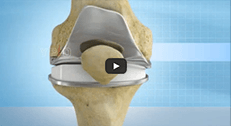Robotic Assisted Partial Knee Surgery
Robotic knee or MAKOplasty® Partial Knee Resurfacing is an innovative treatment option for adults living with early to midstage osteoarthritis (OA) in either the medial (inner), patellofemoral (top), or both compartments of the knee. It is powered by the RIO® Robotic Arm Interactive Orthopedic System, which allows for consistently reproducible precision in performing partial knee resurfacing.
The RIO® System empowers surgeons and hospitals to address the needs of a large and growing, yet currently underserved patient population. Patients who desire a restoration of lifestyle, minimized surgery, reduced pain and rapid recovery may benefit from MAKOplasty®.
Procedure
During the procedure, the diseased portion of the knee is resurfaced, sparing the patient’s healthy bone and surrounding tissue. An implant is then secured in the joint to allow the knee to move smoothly again. MAKOplasty® Partial Knee Resurfacing can:
- Facilitate optimal implant positioning to result in a more natural feeling knee following surgery
- Result in a more rapid recovery and shorter hospital stay than traditional knee replacement surgery
- Be performed on an outpatient basis
- Promote a rapid relief from pain and return to daily activities
As a knee arthroplasty procedure, MAKOplasty® is typically covered by most Medicare-approved and private health insurers.
Robotic Arm Interactive Orthopedic System (RIO®)
The RIO® Robotic Arm Interactive Orthopedic System features three dimensional pre-surgical planning. During surgery, the RIO® provides the surgeon with real-time visual, tactile and auditory feedback to facilitate optimal joint resurfacing and implant positioning. It is this optimal placement that can result in more natural knee motion following surgery.
RIO® Features
- Accurately plan implant size, orientation and alignment utilizing CT-derived 3-D modelling
- Enabling the pre-resection capture of patient-specific kinematic tracking through full flexion and extension
- Real-time intra-operative adjustments for correct knee kinematics and soft-tissue balance
- Minimally invasive and bone sparing, with minimal tissue trauma for faster recovery





